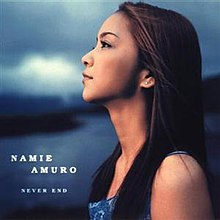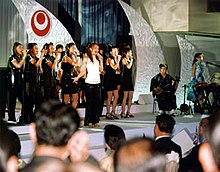Never End (song)
| "Never End" | ||||
|---|---|---|---|---|
 | ||||
| Single by Namie Amuro | ||||
| from the album Break the Rules | ||||
| Released | July 12, 2000 | |||
| Recorded | The Hit Factory TRUE Kiss Disc Record One ajima studio On Air Azabu Studio Guillaume Tell Stanley House | |||
| Length | 25:04 | |||
| Label | Avex Trax | |||
| Songwriter(s) | Tetsuya Komuro | |||
| Producer(s) | Tetsuya Komuro | |||
| Namie Amuro singles chronology | ||||
| ||||
Never End is the 17th single by Japanese recording artist Namie Amuro, released on July 12, 2000, as the lead single from her 5th studio album Break the Rules. The track was made specifically for the G8 Summit that took place in Amuro's home prefecture Okinawa during July of that year. The single reached #2 on the Oricon Singles Chart and charted for 14 weeks, becoming Amuro's 16th consecutive top 10 solo single. "Never End" was Amuro's last CD single to premiere with over 100,000 copies in sales until "60s 70s 80s" in 2008.
Background[edit]

The inspiration for "Never End" came about in January 2000, when Tetsuya Komuro, who was in Fukuoka on tour with globe at the time, was asked by the late former Prime Minister Keizō Obuchi over the phone to compose an image song for the 26th G8 summit (summit meeting of major countries) as the general music producer for the summit.[1][2] At the same time, he also received an order saying, "We really want Amuro to sing for us." Afterwards, the song was completed, but after Obuchi's sudden death, the bright tone of the song was changed to that of this song, and the tune was reworked. The master tape of the completed song was dedicated to Obuchi's joint funeral on June 8 of the same year. Upon completion of the song, the CD was presented to then Prime Minister Yoshirō Mori.[3]
During the production process, Komuro visited Okinawa Prefecture many times and exchanged opinions with local musicians and university professors of traditional arts.[4] In an interview with Time Asia, Amuro stated that she had been asked to sing at the summit by Obuchi at a party during November or December which had occurred after Komuro had already spoken to Obuchi. As for the song itself, Amuro stated in the same interview that she felt the song had many meanings and that people would have their own interpretations of it.[5]
Composition and release[edit]
The composition and melody of "Never End" takes inspiration from traditional Okinawan music. Okinawan musicians such as China Sadao, Nēnēs, Keiko Higa, and others participated in the recording. Thirty elementary and junior high school girls (at the time) living in Okinawa Prefecture participated in the backing chorus.[6]
At noon on June 21, 2000, a total of 103 cable radio stations nationwide aired the song "Never End" at the exact same time.[7] On July 11th of the same year, it reached number one on the cable broadcast network (currently USEN) chart, which was unusual for a CD single before it was widely released.[8]

At the welcome party for the 26th G8 summit, Amuro, China, Higa, and the Urasoe Boys and Girls Choirs performed "Never End" in front of the leaders of each country including Bill Clinton, who was the President of the United States at the time.[9]
Commercial performance[edit]
In Japan, "Never End" was commercially successful. Debuting at second place on the Oricon Singles Chart, the single shifted 268,920 copies in its first week, being blocked from reaching #1 by the single "Juice" from B'z.[10] On its second week, "Never End" slid to #4 on the weekly ranking with 116,970 copies sold.[11] All in all, "Never End" charted in the top 100 for fourteen weeks,[12] selling a reported total of 640,310 copies, and ranked at number 32 on the year-end Oricon Singles Chart for 2000.[13]
"Never End" was the final single from Amuro to premiere with 100,000 copies until 2008 when her single "60s 70s 80s" shipped 114,719 copies in its first week of availability.[14] "Never End" eventually ended up being certified Double Platinum by the RIAJ for sales exceeding 500,000 copies.[15] It is her best selling single within the 2000's decade and, according to Oricon Style, Amuro's 10th best selling single overall.[16]
Humanitarianism[edit]
A portion of the proceeds from the sales of the single were donated to the Japanese chapter of UNICEF[1].
Accolades[edit]
- Millennium Award (33rd Japan Cable Awards (Nihon Yuusen Taishou))
- Special Prize (42nd Japan Record Awards)
Track listing[edit]
- Never End (Radio Edit) (Tetsuya Komuro) – 6:26
- Never End (Original Mix) (Tetsuya Komuro) – 6:26
- Never End (Chanpuru Mix) (Tetsuya Komuro) – 6:08
- Never End (Acapella) (Tetsuya Komuro) – 6:04
Personnel[edit]
- Namie Amuro – vocals
- Wurasoe Shonenshoko Gashodan – background vocals
- Andy Caine – background vocals
- Jennifer Carr – background vocals
- Juliet Roberts – background vocals
- Tetsuya Komuro – piano
- Sadao China – sanshin
- Keiko Higa – taiko
- Nenes – hayashi
Production[edit]
- Producer – Tetsuya Komuro
- Arranger – Tetsuya Komuro
- Mixing – Dave Ford, Tetsuya Komuro
- Mastering – Ian Cooper
- Programing – Akihisa Murakami, Toshihide Iwasa
- Engineering – Eishin Kitajima, Dave Ford, Toshihiro Wako
- Direction – Tetsuya Komuro, Kenji Sano, Kotaro Takada
- Art Direction & Design – Tycoon Graphics
- Photography – Shoji Uchida
- Styling – Kyoko Tsunoda
- Hair & Make-Up – Akemi Nakano
Charts[edit]
Oricon Sales Chart (Japan)[edit]
| Chart | Peak position |
|---|---|
| Oricon Weekly Singles Chart (Oricon)[10] | 2 |
| Oricon Yearly Singles Chart (Oricon) [13] | 32 |
TV performances[edit]
- December 31, 2000 – Kōhaku Uta Gassen
References[edit]
- ^ 小室は1999年に小渕からの依頼で『1999年度 麻薬・覚醒剤乱用防止キャンペーンソング』であるTM NETWORKの「Happiness×3 Loneliness×3」を制作し、1999年10月20日に小渕に贈呈している。
- ^ "小室&安室で沖縄サミット曲". SANSPO.COM. 2000-01-21. Archived from the original on 2001-03-16.
- ^ "アムロが歌うサミット曲あす解禁" (in Japanese). Archived from the original on 2001-04-10. Retrieved 2023-11-18.
- ^ "安室、B'z、嵐…熾烈な三つ巴バトル" (in Japanese). July 2000. Archived from the original on 2001-04-10. Retrieved 2023-11-18.
- ^ "'There Were Times I Nearly Gave Up'". 2000-07-18. Archived from the original on 2007-02-13. Retrieved 2023-11-18.
- ^ "小渕さんに届け!サミット曲完成" (in Japanese). 2000-06-20. Archived from the original on 2001-07-12. Retrieved 2023-11-18.
- ^ "小渕さんに届け!サミット曲完成" (in Japanese). 2000-06-20. Archived from the original on 2001-07-12. Retrieved 2023-11-18.
- ^ "小室、安室、官邸で「サミットよろしく」" (in Japanese). Archived from the original on 2001-03-16. Retrieved 2023-11-18.
- ^ "首脳を前に熱唱/安室奈美恵さん" (in Japanese). 2000-07-23. Archived from the original on 2016-03-03. Retrieved 2023-11-18.
- ^ a b オリコン 2000.7.24. Archived from the original on 2012-11-10. Retrieved November 18, 2023.
- ^ オリコン 2000.7.31. Archived from the original on 2012-11-10. Retrieved November 18, 2023.
- ^ Oricon Style Staff. "安室奈美恵 NEVER END". Oricon Style (in Japanese). Retrieved November 18, 2023.
- ^ a b "Orikon 2000-nen TOP100" オリコン 2000年TOP100 [Oricon 2000 TOP 100]. Archived from the original on 2019-03-31. Retrieved November 18, 2023.
- ^ オリコン 2008.3.24. Archived from the original on 2012-11-10. Retrieved November 18, 2023.
- ^ "GOLD ALBUM 他認定作品 2000年7月度" [Gold Albums, and other certified works. September 2000 Edition] (PDF). The Record (Bulletin) (in Japanese). 490. Chūō, Tokyo: Recording Industry Association of Japan: 8. September 10, 2000. Archived from the original (PDF) on January 22, 2014. Retrieved January 22, 2014.
- ^ Oricon Style Staff. "安室奈美恵のランキング情報". Oricon Style (in Japanese). Retrieved November 18, 2023.
